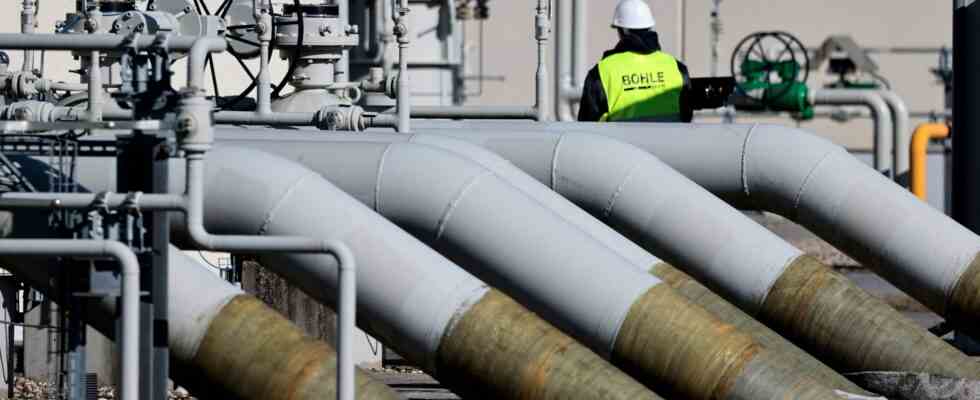Status: 07/11/2022 05:00 a.m
The gas supply emergency is becoming more and more urgent. What options do the Federal Government and the Federal Network Agency have to get the gas crisis under control?
The bottlenecks in the gas supply are coming to a head: the supply of natural gas is alarmingly tight, prices are rising to record highs. The current throttling of Russian deliveries is fueling concern that German gas storage facilities will not be able to be adequately supplied until the winter. The gas storage facilities are currently about 63 percent full. The Gas Storage Act sets the goal of filling 80 percent of the gas storage facilities in Germany by October 1st. By November 1, it should be 90 percent.
Now there are also fears that Russia could use the maintenance of Nord Stream 1, which begins today, to completely halt supplies through that pipeline. The regular process should usually take around two weeks. But a total failure of the Russian gas supply cannot be ruled out. What could the Federal Government and the Federal Network Agency do to overcome this crisis?
The “gas emergency plan”
In order to deal with disruptions in the gas supply, the Energy Security Act provides for a procedure with the “Gas Emergency Plan” with three escalation levels that can be called by the Federal Ministry of Economics depending on the severity of the disruption. After the early warning level at the end of March, the alert level was declared in June. The ministry has thus identified a situation that is leading to a significant deterioration in the gas supply situation. What both situations have in common is that the state has not yet intervened in the market; Market mechanisms are still able to cope with the disruption, so the idea.
However, should the scenario of a delivery stop described above occur or the situation deteriorate solely due to the reduced deliveries, the Ministry can proclaim the third level by decree: the “emergency level”. In this case, there is an “extraordinarily high demand for gas, a significant disruption in the gas supply or another significant deterioration in the supply situation,” the Federal Network Agency put the term in concrete terms.
At level 3, the state intervenes
As soon as the emergency level has been determined, the state is allowed to intervene in the market and in the supply, since it has turned out that the market measures are not sufficient to get the crisis under control. The Federal Network Agency will then become the “federal load distributor”. This means that, in coordination with the network operators, it can, for example, order reductions in purchases, according to the agency.
Initially, such a gas shortage would have little impact on the population, since “protected customers” such as household customers are given preferential treatment. Households, social facilities such as hospitals, kindergartens, retirement homes or gas-fired power plants, which also serve to supply households with heat, should be supplied with gas as far as possible, according to the Federal Network Agency.
consideration on a case-by-case basis
The authority can use decrees to enforce measures such as load reductions, but also shutdowns “to ensure that vital energy needs are covered and thus to keep the effects of a gas shortage on the population as low as possible,” says the Federal Network Agency.
The authority emphasizes that the decisions to be made in a shortage are “always individual decisions”. There is no abstract supply reduction or shutdown order. The decisions must be made with a view to the concerns and importance of the stakeholders involved, but also with a view to the technical network situation and the existing gas flows in an overall assessment.
Because the circumstances that apply in the event of a shortage depend on so many parameters – such as gas storage capacity, weather conditions, European requirements or savings achieved – that they cannot be foreseen. Companies and associations had recently repeatedly warned of production slumps due to a lack of gas and dramatic consequences for the German economy.
Innovations in the Energy Security Act
The Federal Government has obtained further tools through the current legal changes in the Energy Security Act. Federal Economics Minister Robert Habeck (Greens) said that the amended Energy Security Act gives the federal government far-reaching opportunities to intervene in market mechanisms, but also in people’s habits. The new skills are a “sharp sword” that should only be drawn with caution.
The federal government can now prescribe measures to save and reduce consumption. In concrete terms, this means, for example, that it can make regulations on energy-saving measures in the transport sector, for example to reduce commuting. It could also be necessary for employers to offer employees the opportunity to work from home. Furthermore, measures to support stumbling energy companies, including the involvement of the state, will be easier to implement in the future.

